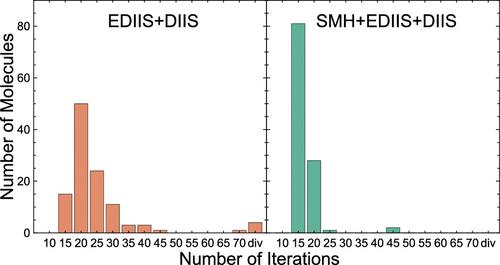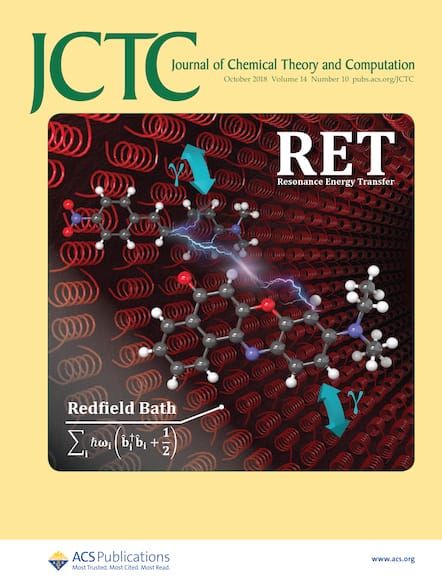基于半经验模型哈密顿的高效稳健的 Ab Initio 自洽场加速算法
IF 5.5
1区 化学
Q2 CHEMISTRY, PHYSICAL
引用次数: 0
摘要
为了加速哈特里-福克(HF)和密度泛函理论(DFT)计算,我们提出了一种使用半经验模型哈密顿的新型双迭代自洽场(SCF)方法(称为 SMH 算法)。该方法首先在每次 SCF 宏迭代中精确构建 Fock 矩阵,然后进行几次 SCF 微迭代,在这些微迭代中使用廉价的半经验近似方法逐步更新 Fock 矩阵。这样,在每次 SCF 宏观迭代中都能以最小的额外成本改进波函数,从而减少了 SCF 收敛所需的精确 Fock 建立次数。SMH 算法可与传统的 SCF 收敛技术相结合,如电平移动、迭代子空间直接反演(DIIS)和能量-DIIS(EDIIS)。与 DIIS 相比,SMH 与 DIIS 结合后,简单有机分子的收敛速度提高了约 10%,而与 EDIIS + DIIS 相比,更具挑战性的过渡金属体系的收敛速度提高了高达 60%。我们的研究结果表明,SMH 是一种可靠的 SCF 加速器,很少出现收敛性恶化的情况,而且具有很强的鲁棒性。本文章由计算机程序翻译,如有差异,请以英文原文为准。

Efficient and Robust Ab Initio Self-Consistent Field Acceleration Algorithm Based on a Semiempirical Model Hamiltonian
A novel doubly iterative self-consistent field (SCF) approach using a semiempirical model Hamiltonian (denoted as the SMH algorithm) is proposed to accelerate the Hartree–Fock (HF) and density functional theory (DFT) calculations. This method first constructs the Fock matrix exactly in each SCF macroiteration, followed by a few SCF microiterations, where the Fock matrix is incrementally updated using an inexpensive semiempirical approximation. This leads to an improved wave function in each SCF macroiteration with minimal additional cost, and therefore a reduced number of exact Fock builds is required for SCF convergence. The SMH algorithm can be combined with conventional SCF convergence techniques such as level shifting, direct inversion in the iterative subspace (DIIS), and energy-DIIS (EDIIS). When integrated with DIIS, SMH enhances the convergence of simple organic molecules by approximately 10% compared to plain DIIS, with speedups of up to 60% for the more challenging transition metal systems compared to EDIIS + DIIS. Our results show that SMH is a reliable SCF accelerator that seldom deteriorates convergence and is highly robust.
求助全文
通过发布文献求助,成功后即可免费获取论文全文。
去求助
来源期刊

Journal of Chemical Theory and Computation
化学-物理:原子、分子和化学物理
CiteScore
9.90
自引率
16.40%
发文量
568
审稿时长
1 months
期刊介绍:
The Journal of Chemical Theory and Computation invites new and original contributions with the understanding that, if accepted, they will not be published elsewhere. Papers reporting new theories, methodology, and/or important applications in quantum electronic structure, molecular dynamics, and statistical mechanics are appropriate for submission to this Journal. Specific topics include advances in or applications of ab initio quantum mechanics, density functional theory, design and properties of new materials, surface science, Monte Carlo simulations, solvation models, QM/MM calculations, biomolecular structure prediction, and molecular dynamics in the broadest sense including gas-phase dynamics, ab initio dynamics, biomolecular dynamics, and protein folding. The Journal does not consider papers that are straightforward applications of known methods including DFT and molecular dynamics. The Journal favors submissions that include advances in theory or methodology with applications to compelling problems.
 求助内容:
求助内容: 应助结果提醒方式:
应助结果提醒方式:


